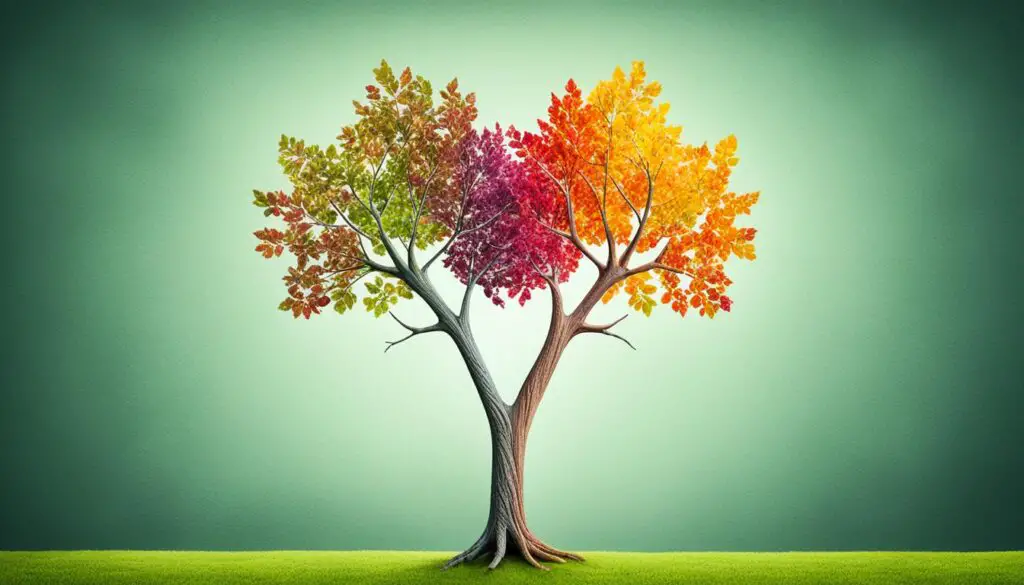Seeking forgiveness and reconciliation is a transformative journey that enables us to restore relationships, heal broken bonds, and mend conflicts. It is through these courageous acts of reconciling with others that we can find closure, rebuild trust, and resolve differences.
In this article, we will explore the importance of forgiveness and reconciliation in promoting personal and community well-being. We will delve into various practices and traditions that offer paths to healing and the restoration of relationships.
Key Takeaways:
- Seeking forgiveness and reconciliation is essential for personal and community well-being.
- Forgiveness is the process of letting go of resentment and anger, while reconciliation involves rebuilding relationships and restoring trust.
- Various paths and practices, including Ho’oponopono, Christian forgiveness, Jewish Teshuvah, Islamic Tawbah, Buddhist Metta, and Hindu Pratikriya, offer unique approaches to healing and reconciliation.
- Prayer can be a powerful tool for seeking forgiveness and reconciliation in various areas of life, such as broken relationships and family divisions.
- Self-forgiveness is a transformative journey that involves acknowledging mistakes, letting go of guilt and shame, and embracing self-acceptance.
The Importance of Forgiveness and Reconciliation
Forgiveness and reconciliation are two powerful acts that have a profound impact on personal well-being and community well-being. When conflicts arise and relationships are strained, the act of forgiveness helps mend broken bonds and release negative emotions. By choosing to forgive, individuals can experience a sense of peace and liberation from anger and resentment.
Moreover, the importance of reconciliation should not be underestimated. Reconciliation involves actively working towards resolving differences and rebuilding trust. It requires open communication, understanding, and a willingness to heal and move forward. When individuals and communities come together to engage in the process of reconciliation, they pave the way for growth and unity.
“Forgiveness is the final form of love.” – Reinhold Niebuhr
Personal well-being is greatly enhanced when forgiveness is embraced. It allows individuals to let go of the emotional burden that comes with holding grudges and harboring resentment. By forgiving others, individuals free themselves from the negative impact of past experiences and can focus on personal growth and positivity. The act of forgiveness is a powerful tool for self-healing and finding closure.
On a community level, forgiveness and reconciliation promote harmony and a sense of belonging. By resolving conflicts and rebuilding trust, communities can foster stronger bonds and create an environment that supports the well-being and growth of its members. The act of reconciliation serves as a catalyst for positive change and unity.
“The practice of forgiveness is our most important contribution to the healing of the world.” – Marianne Williamson
Understanding Forgiveness and Reconciliation
In order to grasp the power and significance of seeking forgiveness and reconciliation, it is crucial to understand the definitions of these two concepts.
Forgiveness can be defined as the process of letting go of resentment and anger towards a wrongdoer, and finding a sense of inner peace and closure. It is a deeply personal choice and involves releasing negative emotions associated with the hurtful actions of others.
Reconciliation, on the other hand, goes beyond forgiveness and encompasses the restoration of a broken relationship. It involves rebuilding trust, fostering understanding, and actively working towards healing and unity with the person who caused the harm. Reconciliation requires mutual commitment, effort, and the willingness to address the root causes of the conflict.
While forgiveness is a personal journey that can be undertaken independently, reconciliation necessitates the participation and cooperation of both parties involved. Forgiveness is about finding inner peace and releasing negative emotions, whereas reconciliation focuses on repairing and restoring the damaged relationship.
Take a moment to reflect on the following table that highlights some key differences between forgiveness and reconciliation:
| Forgiveness | Reconciliation |
|---|---|
| Individual process | Mutual process |
| Letting go of resentment and anger | Rebuilding trust and repairing the relationship |
| Self-healing and closure | Restoring connection and unity |
| Personal choice | Mutual commitment |

Understanding the distinction between forgiveness and reconciliation can help individuals navigate their healing journeys more effectively. It allows us to recognize that while forgiveness is an important first step towards healing, reconciliation requires dedication, open communication, and mutual effort to rebuild trust and mend the broken bonds.
Exploring Different Paths to Forgiveness and Reconciliation
Various paths and practices exist for seeking forgiveness and reconciliation. These include the Hawaiian practice of Ho’oponopono, Christian confession and forgiveness, Jewish Teshuvah and atonement, Islamic Tawbah and Istighfar, Buddhist cultivation of loving-kindness (Metta), and Hindu rituals of self-purification (Pratikriya). Each of these traditions offers unique insights and approaches to healing and reconciliation.
Forgiveness:
- Ho’oponopono is a traditional Hawaiian practice that focuses on reconciliation and forgiveness. It involves four key phrases: “I’m sorry, please forgive me, thank you, I love you.” This practice emphasizes the restoration of harmony and healing through personal responsibility and reconciliation with oneself and others.
- Christian forgiveness is deeply rooted in the teachings of Jesus Christ. It involves acknowledging one’s sins, repenting, and seeking forgiveness from God and others. Christians believe that by extending forgiveness to others, they reflect the forgiveness they have received from God.
- Teshuvah is a Jewish practice of repentance and returning to one’s true self. It involves self-reflection, confession of sins, asking for forgiveness, and making amends. The process of Teshuvah is seen as a means of restoring balance, seeking reconciliation with God, and mending relationships with others.
- In Islam, Tawbah refers to sincere repentance and seeking forgiveness from Allah. It involves acknowledging one’s mistakes, feeling remorse, and striving to change one’s behavior. Istighfar is the practice of seeking forgiveness through supplication and prayers. Muslims believe in the transformative power of forgiveness and the restoration of relationships through sincere repentance.
- Buddhist Metta meditation focuses on cultivating loving-kindness towards oneself and others. It involves offering well-wishes, compassion, and forgiveness to all beings. By practicing Metta, Buddhists aim to foster a sense of interconnectedness and harmony, transcending individual conflicts.
- Hinduism emphasizes the purification of the self through rituals and practices such as Pratikriya. These rituals include prayers, fasting, and acts of selflessness to seek forgiveness for past wrongdoings and restore spiritual purity.
Each path offers unique and valuable insights into forgiveness and reconciliation, allowing individuals to embark on their own healing journeys.

Table: A Comparison of Different Paths to Forgiveness and Reconciliation
| Tradition | Core Beliefs and Practices |
|---|---|
| Ho’oponopono | Restoration of harmony through reconciliation and personal responsibility |
| Christian forgiveness | Acknowledgment of sins, repentance, and seeking forgiveness from God and others |
| Teshuvah | Self-reflection, confession, asking for forgiveness, and making amends |
| Islamic Tawbah | Sincere repentance, seeking forgiveness from Allah, and striving to change |
| Buddhist Metta | Cultivation of loving-kindness towards oneself and all beings |
| Hindu Pratikriya | Rituals and acts of selflessness to seek forgiveness and restore purity |
By exploring and embracing these different paths to forgiveness and reconciliation, individuals can find solace, healing, and restored relationships.
The Power of Prayer in Seeking Forgiveness and Reconciliation
Prayer holds a profound power in the journey of seeking forgiveness and reconciliation. It serves as a source of comfort, guidance, and spiritual support during emotionally challenging times. Through heartfelt prayers, we can address specific areas of brokenness in relationships and find solace in the process of healing.
“Prayer has the power to heal wounds and mend broken bonds.”
“Prayer is not asking. It is a longing of the soul. It is daily admission of one’s weakness. It is better in prayer to have a heart without words than words without a heart.” – Mahatma Gandhi
When seeking forgiveness and reconciliation in broken relationships, prayer can play a transformative role. Through words of reconciliation, understanding, and empathy, we can ask for healing and restoration of the connection that was once severed. Prayer fosters an environment of forgiveness and allows us to release resentment, paving the way for reconciliation to occur.
“Pray for the healing of broken relationships, for forgiveness to find its way.”
In moments of self-reflection and introspection, prayer becomes a vessel for self-forgiveness and release. It enables us to confront our faults, acknowledge our mistakes, and seek inner healing. Through prayer, we can extend compassion to ourselves and let go of guilt and shame, ultimately embracing self-acceptance and personal growth.
“Prayer grants us the strength to forgive ourselves and embrace self-acceptance.”
| Prayer for Healing Family Divisions | Prayer for Reconciliation in Friendships |
|---|---|
|
|
Through prayer, we can find solace, guidance, and strength to seek forgiveness and reconciliation in various areas of our lives. It allows us to tap into our spirituality and connect with a higher power, helping us navigate the complexities of healing broken relationships, finding self-forgiveness, healing family divisions, and seeking forgiveness in friendships.
Next, we will explore the transformative journey of self-forgiveness and the importance of nurturing reconciliation within families.

The Transformative Journey of Self-Forgiveness
Self-forgiveness is a crucial part of the healing process. It requires acknowledging our mistakes, letting go of guilt and shame, and embracing self-acceptance. Through prayers and self-reflection, individuals can experience inner healing and cultivate a more compassionate and forgiving attitude towards themselves.
Letting go of guilt and shame is not an easy task, but it is necessary for personal growth and emotional well-being. By recognizing our imperfections and understanding that we all make mistakes, we can free ourselves from the burden of self-judgment. Self-forgiveness is not about condoning or forgetting the past, but about releasing the negative emotions that hold us back.
Self-acceptance is another essential aspect of self-forgiveness. It involves acknowledging our humanity and embracing our flaws and limitations. By accepting ourselves as imperfect beings, we open the doors to self-love and compassion. It allows us to treat ourselves with kindness and understanding, just as we would to a dear friend.
Prayer can be a powerful tool in the journey of self-forgiveness. It provides solace, guidance, and an opportunity to connect with a higher power. Through prayer, we can seek forgiveness from a divine source and ask for strength and guidance in our healing process.
Benefits of Self-Forgiveness and Inner Healing
“To forgive oneself is to be able to look at oneself in the mirror without cringing… It is to become one’s own best friend…” – Robert Muller
The transformative journey of self-forgiveness offers numerous benefits for personal growth and well-being:
- Emotional liberation: Letting go of guilt and shame allows us to release negative emotions and experience emotional freedom. It brings relief and lightness to the heart, fostering inner peace and happiness.
- Increased self-esteem: Self-forgiveness helps build a positive self-image and enhances self-esteem. When we accept our mistakes and show ourselves compassion, we cultivate a healthier sense of self-worth.
- Improved relationships: Inner healing through self-forgiveness positively impacts our relationships with others. It allows us to interact with empathy, understanding, and forgiveness, creating stronger and more authentic connections.
- Stress reduction: Releasing guilt and shame reduces stress levels and promotes overall well-being. When we let go of negative self-talk and self-criticism, we experience greater peace of mind and contentment.
Self-forgiveness is a courageous and transformative process that requires patience, self-reflection, and forgiveness. It allows us to nurture a compassionate relationship with ourselves and create space for healing and growth.

Nurturing Reconciliation within Families
Family relationships are foundational, and nurturing reconciliation within families is essential for fostering understanding and peace. When conflicts arise, it is important to find ways to heal family divisions and promote forgiveness. By seeking healing and reconciliation, families can strengthen their bonds and create a foundation of love and support.
One powerful tool for nurturing reconciliation within families is prayer. Prayers can be used to address conflicts, promote forgiveness, and restore harmony within family units. They provide a space for reflection, expression of emotions, and seeking guidance from a higher power.
“Family is not an important thing, it’s everything.” – Michael J. Fox
Through prayer, family members can express their desire for healing and reconciliation, both for themselves and for their loved ones. Prayers for forgiveness can help release resentment and anger, opening the door for understanding and compassion.
Additionally, prayers can serve as a vehicle for communication and reconciliation between family members. By coming together in prayer, families can create an environment of openness and vulnerability, where grievances can be aired and forgiveness can be sought.
Promoting Understanding and Peace
Prayer is not just about seeking forgiveness; it is also a means of promoting understanding and peace within families. By praying for wisdom and empathy, family members can gain insight into each other’s perspectives and develop a deeper sense of empathy.
Furthermore, prayer can foster a sense of unity and shared purpose within the family. Coming together to pray strengthens the bond between family members and reinforces the idea that they are a team, supporting and loving one another.
Ultimately, nurturing reconciliation within families requires a commitment to understanding, forgiveness, and promoting peace. By utilizing the power of prayer, families can embark on a journey of healing, creating a harmonious and loving environment where relationships can flourish.

| Quote | Author |
|---|---|
| “In family life, love is the oil that eases friction, the cement that binds closer together, and the music that brings harmony.” | Friedrich Nietzsche |
| “The family is the test of freedom; because the family is the only thing that the free man makes for himself and by himself.” | Gilbert K. Chesterton |
| “In family life, love is spelled T-I-M-E.” | Dieter F. Uchtdorf |
Nurturing reconciliation within families is a transformative process that requires patience, understanding, and a willingness to let go of past grievances. Through prayer and a commitment to promoting understanding and peace, families can heal divisions, strengthen their bonds, and create a loving and harmonious environment for all members.
Seeking Forgiveness in Friendships
Friendships hold a special place in our lives, but they are not immune to the challenges and conflicts that can strain any relationship. When friendships face difficulties, forgiveness becomes a powerful tool for healing broken bonds, fostering humility, and cultivating understanding. By embracing forgiveness, we can restore trust and strengthen these invaluable connections.
Prayers for forgiveness in friendships offer a meaningful approach to repairing the damage that may have occurred. These heartfelt prayers can be channels for expressing remorse, seeking reconciliation, and extending forgiveness. They serve as a source of guidance, comfort, and transformation, helping individuals navigate through the complexities of repairing a fractured friendship.
“Friendship is delicate, just like a flower in the garden. Forgiveness is the rain that nurtures and revives its beauty.” – Unknown
Forgiveness in friendships requires embracing humility and understanding. It involves acknowledging our own faults and shortcomings while acknowledging the humanity of our friends. By letting go of resentment and anger, we create space for healing and growth, allowing the friendship to blossom once again.
Restoring trust is a crucial aspect of forgiveness in friendships. This process may take time and consistent effort from both parties involved. Through honest communication, active listening, and a commitment to rebuilding, trust can be rebuilt and the friendship can be renewed.
Friendships have the power to enrich our lives and bring joy, support, and companionship. However, they can also experience strain and require forgiveness to thrive. By seeking forgiveness in friendships, embracing humility, and fostering understanding, we have the opportunity to heal broken bonds and strengthen these important relationships.
Embracing Ancient Wisdom for Healing and Reconciliation
The teachings of forgiveness and reconciliation found in various religious and spiritual traditions offer profound insights and wisdom. While the specific practices may differ, there are common themes that resonate across these ancient wisdom traditions, emphasizing the power of forgiveness and the importance of healing and unity.
In these traditions, forgiveness is seen as a transformative act that involves acknowledging wrongdoing and letting go of resentment. It is a deeply personal journey that requires self-reflection, empathy, and compassion. By forgiving others, individuals can experience liberation from negative emotions and release the burden of carrying grudges.
Furthermore, these ancient wisdom traditions highlight the significance of seeking forgiveness. It is a humbling process that involves acknowledging one’s faults and taking responsibility for one’s actions. By seeking forgiveness, individuals not only begin the process of healing and reconciling with others but also foster personal growth and transformation.
Shared human experiences are a common thread throughout these teachings. They remind us that forgiveness and reconciliation are essential for the well-being of individuals, communities, and society as a whole. By embracing these ancient wisdom traditions, we can tap into a collective reservoir of knowledge and practices that have withstood the test of time.
“Forgiveness is not an occasional act; it is a constant attitude.” – Martin Luther King Jr.
Through forgiveness and reconciliation, we can break the cycle of resentment and anger, promoting understanding, healing, and unity. These teachings serve as guideposts, offering practical wisdom for navigating personal conflicts, healing broken relationships, and nurturing a more compassionate world.
Now, let us explore some common themes in forgiveness as conveyed by different traditions:
The Role of Compassion
Compassion lies at the core of forgiving and reconciling with others. In the Buddhist tradition, the practice of Metta, or loving-kindness, emphasizes cultivating compassion for oneself and others. By extending compassion to those who have caused harm, individuals can begin the journey of forgiveness and reconciliation.
The Power of Self-Reflection
Self-reflection plays a pivotal role in forgiveness and reconciliation. In Christianity, the process of examination of conscience and confession encourages individuals to reflect on their actions and seek forgiveness from God and others. This introspective practice facilitates personal growth and paves the way for reconciliation.
The Importance of Repairing Relationships
Restoring broken relationships is a fundamental aspect of forgiveness and reconciliation. In Judaism, the process of Teshuvah involves seeking forgiveness from those whom one has wronged and actively working to repair damaged relationships. This commitment to repairing the fabric of relationships promotes healing and unity.
The table below provides a summary of some ancient wisdom traditions and their approaches to forgiveness and reconciliation:
| Tradition | Key Teachings |
|---|---|
| Buddhism | Emphasizes cultivating compassion (Metta) and letting go of attachments |
| Christianity | Encourages confession, repentance, and extending forgiveness to others |
| Judaism | Fosters reconciliation through the process of Teshuvah and seeking forgiveness |
| Islam | Emphasizes repentance (Tawbah) and seeking forgiveness from God and others |
| Hinduism | Promotes self-purification (Pratikriya) and seeking forgiveness through rituals |
Acknowledging the wisdom within these traditions allows us to tap into the collective understanding of forgiveness and reconciliation. By embracing ancient wisdom, we can draw strength and guidance as we navigate our own paths towards healing, unity, and personal growth.
The Universal Call to Unity and Healing
In a world divided by negativity and discord, unity and healing have become more vital than ever. The teachings of forgiveness and reconciliation emphasize the importance of compassion, shared problem-solving, and embracing our common humanity. By recognizing the shared experiences that bind us together, we can work towards healing and reconciliation, fostering a more harmonious and compassionate world.
“Compassion and tolerance are not sign of weakness, but a sign of strength.” – Dalai Lama
Unity is the foundation upon which we build relationships, communities, and societies. It is through embracing commonality that we can collectively address the challenges we face, finding collaborative solutions that benefit all. By fostering a spirit of compassion and empathy, we can bridge divides and promote understanding, furthering our progress as a global community.
Shared problem-solving plays a crucial role in healing and reconciliation. When we come together with an open mind, willing to understand different perspectives, we create space for dialogue and growth. Through respectful and empathetic conversations, we can find common ground, overcome conflicts, and forge bonds that transcend our differences.
The Transformative Power of Unity
- Unity fosters a sense of belonging and purpose, reminding us that we are all interconnected.
- By embracing unity, we can break down barriers, promote justice, and advocate for equitable opportunities for all.
- Unity strengthens communities, enabling them to overcome adversity and thrive.
In the words of Nelson Mandela, “No one is born hating another person because of the color of his skin, or his background, or his religion. People must learn to hate, and if they can learn to hate, they can be taught to love, for love comes more naturally to the human heart than its opposite.” This sentiment highlights the innate capacity for unity and healing that resides within each of us.
We must strive to embrace our shared humanity, transcending divisions and working towards reconciliation. Through unity, compassion, shared problem-solving, and embracing our commonality, we can build a better world filled with understanding, healing, and true connection.
Conclusion
Seeking forgiveness and reconciliation is a transformative journey that holds tremendous potential for personal and community healing. Through the practices explored in this article, such as forgiveness, confession, and embracing ancient wisdom traditions, individuals and communities can embark on a path of healing, growth, and unity. By acknowledging our shared humanity and the importance of healing broken bonds, we can build stronger, more compassionate relationships.
Forgiveness and reconciliation serve as powerful tools for resolving conflicts, mending broken relationships, and rebuilding trust. They enable us to let go of resentment and anger, promoting inner healing and restoring harmony in our lives and communities. By seeking forgiveness and engaging in the process of reconciliation, we pave the way for finding closure, restoring bonds, and fostering understanding.
As we journey towards healing and reconciliation, let us remember that this process requires patience, humility, and a willingness to listen and understand different perspectives. Through genuine efforts to seek forgiveness and reconcile with others, we can create a brighter future for ourselves and future generations. By embracing forgiveness, nurturing reconciliation, and resolving differences, we can build a more compassionate and harmonious world.
FAQ
What is forgiveness and reconciliation?
Forgiveness is the process of letting go of resentment and anger towards a wrongdoer, while reconciliation involves rebuilding the relationship and restoring trust.
Why is forgiveness and reconciliation important?
Forgiveness and reconciliation play vital roles in promoting personal and community well-being. They help mend broken bonds, resolve conflicts, and rebuild trust.
How can I seek forgiveness and reconciliation?
Various paths and practices exist for seeking forgiveness and reconciliation, such as the Hawaiian practice of Ho’oponopono, Christian confession and forgiveness, Jewish Teshuvah and atonement, Islamic Tawbah and Istighfar, Buddhist cultivation of loving-kindness (Metta), and Hindu rituals of self-purification (Pratikriya).
How can prayer help in seeking forgiveness and reconciliation?
Prayer is a powerful tool for seeking forgiveness and reconciliation. It provides comfort, guidance, and spiritual support during emotionally challenging times. Different prayers can be used to address specific areas of brokenness, such as reconciling broken relationships, seeking self-forgiveness, healing family divisions, and seeking forgiveness in friendships.
What is self-forgiveness?
Self-forgiveness is a crucial part of the healing process. It involves acknowledging our mistakes, letting go of guilt and shame, and embracing self-acceptance. Through prayers and self-reflection, individuals can experience inner healing and cultivate a more compassionate and forgiving attitude towards themselves.
How can forgiveness and reconciliation be nurtured within families?
Nurturing reconciliation within families is essential for fostering understanding and peace. Prayers can be used to address conflicts, promote forgiveness, and restore harmony within family units. By seeking healing and reconciliation, families can strengthen their bonds and create a foundation of love and support.
Can friendships experience strain and require forgiveness?
Yes, friendships can also experience strain and require forgiveness. Prayers for forgiveness in friendships can help repair broken bonds, cultivate humility and understanding, and restore trust. By seeking forgiveness in friendships, individuals can nurture and strengthen these important relationships.
What can we learn from ancient wisdom traditions about forgiveness and reconciliation?
The teachings of forgiveness and reconciliation found in various religious and spiritual traditions offer profound insights and wisdom. While the specific practices may differ, there are common themes of acknowledging wrongdoing, seeking forgiveness, and promoting healing and unity. These ancient wisdom traditions remind us of our shared humanity and the universal need for healing and reconciliation.
Why is unity and healing important in today’s world?
In a world divided by negativity and discord, the universal call to unity and healing is more relevant than ever. The teachings of forgiveness and reconciliation emphasize the importance of compassion, shared problem-solving, and embracing our common humanity. By recognizing our shared experiences and working towards healing and reconciliation, we can create a more harmonious and compassionate world.
How can seeking forgiveness and reconciliation transform individuals and communities?
Seeking forgiveness and reconciliation is a transformative journey that promotes healing, growth, and unity. Through the practices explored in this article, individuals and communities can embrace forgiveness, nurture reconciliation, and build stronger, more compassionate relationships. By acknowledging our shared humanity and embracing healing and reconciliation, we can create a brighter future for ourselves and generations to come.








